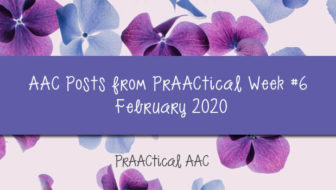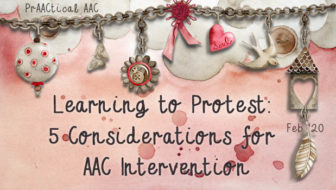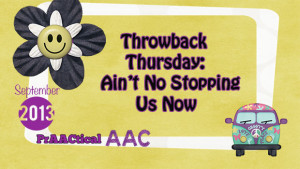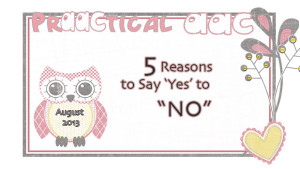February 9, 2020
by Carole Zangari -

Happy Sunday, AAC friends! We have a few posts for you to browse. Monday – Learning to Protest: 5 Considerations for AAC Intervention Tuesday – AAC Link Up Wednesday – Video of the Week: Roadmap to a Communication Positive School Thursday – Throwback Thursday: Helping Teams Provide Better AAC Support :::::::::::::::::::::::::::::::::::::::::::::::::::::::::::::::::::::::::::::::::::::::::::::::::::::::::: In the mood for a little more AAC reading? Here are some suggestions. Getting ready for a core vocabulary journey Make It Monday: Manual communication boards with core vocabulary Make It Monday: More words, please! Expanding our manual communication boards Super Size It: 5 ideas for making large communication boards Beyond requesting: A week of routines to increase AAC use at mealtimes 5 ways to build understanding Free resources for making AAC and visual supports 5 places for shared AAC materials
Filed under: Featured Posts, PrAACtical Thinking
Tagged With: core vocabulary, protesting
February 3, 2020
by Carole Zangari -

Stop it. No, thank you. Don’t do that. I don’t want ___. Not now. In order to be able to express what they are really thinking, AAC learners need the vocabulary and skills to be able to tell us when they don’t like something or when they do not want to participate. Here are some thoughts about facilitating their growth in this area. Review the vocabulary and messages that are available to the learner. Consider single words (e.g., no, not, stop) and contractions (e.g., don’t, can’t, won’t, shouldn’t), as well as prestored messages that will make it faster and easier to express themselves under stressful conditions when the need for protesting is most important (e.g., I don’t want to. I want you to stop. Don’t make me to that.). Model negation in various contexts. Narrate your own experiences throughout the day (e.g., I don’t want to eat that. Stop touching... [Read More...]
Filed under: Featured Posts, PrAACtical Thinking
Tagged With: AAC intervention, protesting, rejecting
September 26, 2013
by Robin Parker -

(updated/original version published on October 20, 2012) Sometimes saying ‘no’ to the demands of the day actually helps us rejuvenate and allows us to be more productive. Saying ‘no to false information helps us to advocate for ourselves. The ‘no’ topic seems to be trending now. There have been quite a few blog posts and comments about the issue (Just Say No, How and When to Give Your Students A Break). We are so glad that this topic is getting more focus. Of course everyone agrees that ALL people have the right to say ‘no’. But it is not always so simple. There are many types of ‘no’. There is the outright ‘no’, the ‘no’ to more work, the ‘no’ for disagreement, the ultra important ‘NO’ to unwanted touching, and many more. And depending upon how you say ‘no’ is the difference between it being accepted or… NOT. The issue... [Read More...]
Filed under: PrAACtical Thinking
Tagged With: protesting
August 9, 2013
by Robin Parker -

We had a ‘situation’ yesterday which really was sign of progress and not a ‘situation’ at all. We know a young adult who is non-verbal and communicates primarily with an object communication system. He is typically happy and at the very least passive. Usually this learner will participate in any activity even if he does not like it. He will follow the sequence, follow instructions, and do what is expected but with minimal communication if it is an undesired activity. Of course, we try to do things he likes, but sometimes it is not so clear, it can change, or it just may be too much of a good thing. Back to the story….we had a special session planned with many of his favorite things. Awesome things, things we had been waiting to do with him. We even had a special guest who had special things. However, when we started... [Read More...]
Filed under: PrAACtical Thinking
Tagged With: communication, protesting
October 20, 2012
by Robin Parker -

Sometimes saying ‘no’ to the demands of the day actually helps us rejuvenate and allows us to be more productive. Saying ‘no to false information helps us to advocate for ourselves. The ‘no’ topic seems to be trending now. There have been quite a few blog posts and comments about the issue (Just Say No, How and When to Give Your Students A Break). We are so glad that this topic is getting more focus. Of course everyone agrees that ALL people have the right to say ‘no’. But it is not always so simple. There are many types of ‘no’. There is the outright ‘no’, the ‘no’ to more work, the ‘no’ for disagreement, the ultra important ‘NO’ to unwanted touching, and many more. And depending upon how you say ‘no’ is the difference between it being accepted or… NOT. The issue of saying ‘no’ gets more complicated when... [Read More...]
Filed under: PrAACtical Thinking
Tagged With: breaks, communication, protesting, saying 'no'




